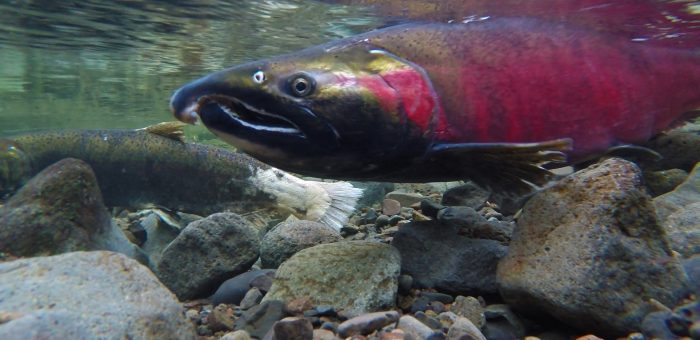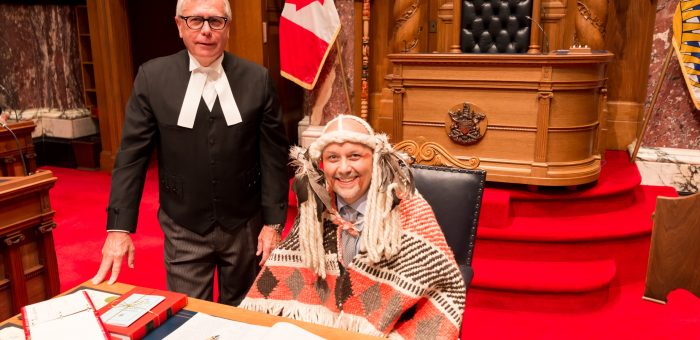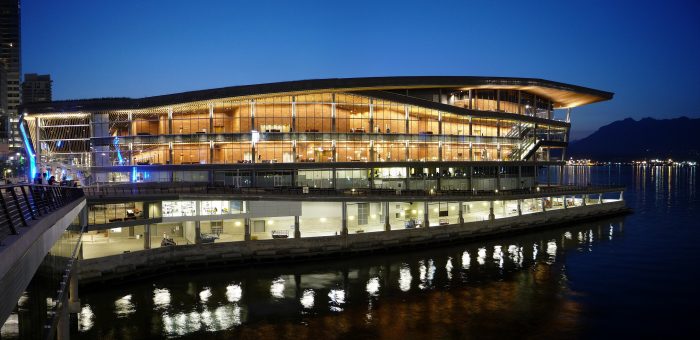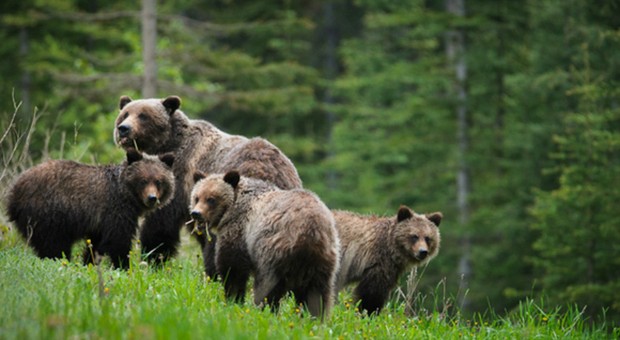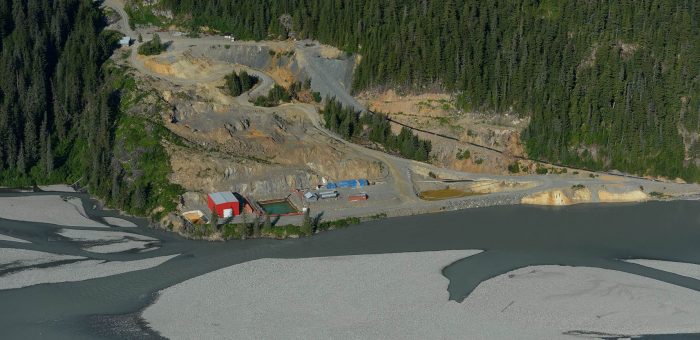First Nations
Fish Farms and the Need to Protect Wild Salmon
Last week I sent a letter to B.C.’s Minister of Agriculture seeking clarity as to what the B.C. government is planning to do to promote and facilitate the transition from ocean based, open net fish farms to land based closed containment systems. Today, I followed up with her in Question Period. As you will see from the exchange reproduced below, I was very pleased with the thoughtful answers provided by Minister Popham.
 Fish farms have long been contentious on the B.C. coast due to concerns about sea lice, disease, escaped non-native species, and the impact these contaminants are having on wild stocks – many of which are already significantly depleted. Tensions between some First Nations and operating farms have escalated in the last few weeks following a salmon spill near the San Juan Islands. While action on this file is long overdue, a responsible and effective move to protect our wild salmon stocks now seems especially urgent.
Fish farms have long been contentious on the B.C. coast due to concerns about sea lice, disease, escaped non-native species, and the impact these contaminants are having on wild stocks – many of which are already significantly depleted. Tensions between some First Nations and operating farms have escalated in the last few weeks following a salmon spill near the San Juan Islands. While action on this file is long overdue, a responsible and effective move to protect our wild salmon stocks now seems especially urgent.
The B.C. Green caucus position on fish farms has always been very clear. We need to get fish farms out of the migratory paths of wild salmon. And, at the same time, the provincial government needs to promote the establishment of closed-containment systems on land.
Prior to the last election, the B.C. NDP were also very clear about their commitment to shut down open-net farms and move to closed containment, land-based fish farms. They promised to implement the recommendations of the Cohen Commission as well. This past April, NDP North Island MLA Claire Trevena – now the Minister of Transportation and Infrastructure – told a gathering of indigenous leaders in Alert Bay that if elected, her party would remove fish farms from coastal waters. “We will remove fish farms, we are committed to that and we can actually form government to make this happen and make sure that these territories and the North island are clear of fish farms”
“It can happen here,” she said of a shift to land-based fish farming. “We will make sure it does.”
These are strong words. Unfortunately, jurisdictional divisions threaten to make this far easier said than done. The federal Fisheries and Oceans Canada (DFO) department is responsible for the regulation of most aspects of the aquaculture industry in B.C. The government of Canada issues licences for marine finfish, shellfish and freshwater (or land-based) operations. Licences stipulate the volume and species that may be produced at a site and outline requirements for fish health, sea lice levels, fish containment and waste control.
To complete that structure, the province of B.C. issues tenures where operations take place in either the marine or freshwater environment, licenses marine plant cultivation, and manages business aspects of aquaculture such as work place health and safety.
So, the province only has jurisdiction over one piece of the fish farm regulatory puzzle, but it is still an important one and there is still a lot of room for progress to be made. In collaboration with First Nations and the federal government the province can take it even further. The B.C. Green caucus remains committed to advancing this issue, and making sure the NDP government does the same.
The leading closed-containment Atlantic salmon company in Canada is Kuterra, based in Port McNeill and owned by the Namgis First Nation. Kuteraa received part of its funding from Tides Canada on the basis that it provide open access to its knowledge and since become an industry leader.
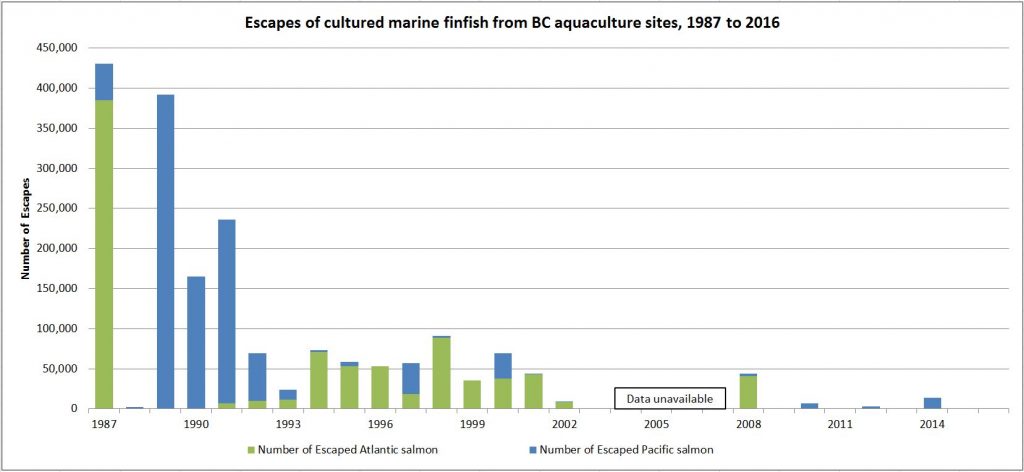 To their credit, the ocean based B.C. fish farming industry has taken measures to improve security and there have been very few escapes over the past five years. The last major escape of Atlantic salmon from a B.C. operation was in 2008 and the most recent significant fish spill was in 2014 when more than 13,000 farmed rainbow trout escaped from an operation at Brettell Point, near Powell River. This summer’s incident in U.S. waters, however, highlights the continued risk of farming Atlantic salmon in open net pens. Escaped salmon increase the risk of spreading disease to wild stocks, and heighten competition with wild Pacific salmon, which are endangered in many B.C. watersheds. It is time for governments to help the fish farming industry transition from open-net farms to closed containment land based facilities. It is time to prioritize the protection of wild salmon.
To their credit, the ocean based B.C. fish farming industry has taken measures to improve security and there have been very few escapes over the past five years. The last major escape of Atlantic salmon from a B.C. operation was in 2008 and the most recent significant fish spill was in 2014 when more than 13,000 farmed rainbow trout escaped from an operation at Brettell Point, near Powell River. This summer’s incident in U.S. waters, however, highlights the continued risk of farming Atlantic salmon in open net pens. Escaped salmon increase the risk of spreading disease to wild stocks, and heighten competition with wild Pacific salmon, which are endangered in many B.C. watersheds. It is time for governments to help the fish farming industry transition from open-net farms to closed containment land based facilities. It is time to prioritize the protection of wild salmon.
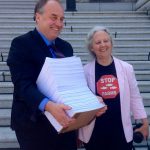 In May, 2015, I was afforded the honour of introducing a petition by 108,848 people who are asking the government to please not issue licences of occupation to salmon farms trying to expand in British Columbia. I also introduced a second petition signed by more than 100 business organizations across the province who supported the individuals who signed the larger petition. The business organizations argued that they are convinced by the published scientific evidence that open net salmon farms are a threat to B.C. wild pacific salmon.
In May, 2015, I was afforded the honour of introducing a petition by 108,848 people who are asking the government to please not issue licences of occupation to salmon farms trying to expand in British Columbia. I also introduced a second petition signed by more than 100 business organizations across the province who supported the individuals who signed the larger petition. The business organizations argued that they are convinced by the published scientific evidence that open net salmon farms are a threat to B.C. wild pacific salmon.
Below I reproduce the exchange I had with Minister Popham as well as the accompanying media release
Video of Question Period Exchange
Question
A. Weaver: The 2017 B.C. election platform states this.
“We will ensure that the salmon farming industry does not endanger wild salmon by implementing the recommendations of the Cohen Commission, keeping farmed sites out of the important salmon migration routes and supporting research and transparent monitoring to minimize the risk of disease transfer from captive to wild fish.“
In addition, the Minister of Transportation and Infrastructure promised First Nation leaders, in Alert Bay on April 23 of 2017:
“We will remove fish farms, we are committed to that, and we can actually form government to make this happen and make sure that these territories and the north Island are clear of fish farms.“
She did so, with respect, as a means or way of convincing First Nation leaders not to vote for the B.C. Green Party.
My question to the Minister of Agriculture is this: what is the government’s plan now to implement the recommendations of the Cohen commission and assist in the transition from ocean-based fish farms to land-based closed-containment systems?
Mr. Speaker: If it was always that friendly.
Answer
Hon. L. Popham: Thank you to the member for Oak Bay–Gordon Head for the question. I appreciate it, and I want to assure the member and the people of British Columbia that our government is deeply committed to protecting B.C.’s wild salmon. It’s essential to our economy, it’s essential to our province, and it’s essential to our B.C. First Nations.
The Cohen commission recommendations are something that we did commit to in our platform, and we are absolutely committed to fulfilling those recommendations. There are federal recommendations and there is B.C.’s portion of those recommendations, and we are committing to do that.
Also, I’m sure the member probably knows that, but I did want to point out that in 2010 there was a Hinkson decision which moved the responsibility for fish health and licensing of fish farms to the federal government. The provincial government has the responsibility for tenures. It’s important to know that at this time, as we’re figuring out where we go next, there are no tenures being approved and no renewal of tenures being approved.
Supplementary Question
A. Weaver: First off, I do wish to thank the official opposition for their support in the question. I’m sure they thought I was going to offer a softball, but this is a very serious question that we would like to actually get details on.
I’d like to acknowledge that this is a very complex multi-jurisdictional issue, but let me be very clear. The Minister of Transportation and Infrastructure was forthright and clear that her government was going to remove fish farms from the migratory tracks of sockeye salmon — period. She said that to First Nation leaders in the north Island and convinced them not to vote for the B.C. Green Party because of that.
Now, my question, again to the Minister of Agriculture, is this. Does she intend, in her mandate, to end the use of open-net fish farms along the migratory passage of sockeye system, as promised to British Columbians by the now Minister of Transportation and Infrastructure?
Answer
Hon. L. Popham: Thank you, Mr. Speaker.
Interjections.
Mr. Speaker: Members, we shall…. The friendliness is wonderful, but we shall hear the minister’s response.
Hon. L. Popham: Thank you, Mr. Speaker, and thank you again for your question. I’m not sure if the member knows, but I am waiting for the recommendations coming from a report from the Minister of Agriculture’s advisory council on finfish aquaculture, which has been looking at the issue. I expect that report to be coming forward with recommendations at the end of this year. While I wait for those recommendations, I have already been on the ground, meeting with stakeholders. I’ve met with First Nations, the industry.
I’ve also sat down with the Minister of Fisheries, Minister LeBlanc from the federal government, and invited him to come sit at the table with us, because I think it’s going to take the provincial government, the federal government, First Nations and industry to sit together as we move forward and figure out the recommendations and how to implement them.
Media Release
Weaver seeks action from government to end ocean based fish farming
For immediate release
September 13, 2017
VICTORIA, B.C. – Andrew Weaver, leader of the B.C. Green caucus, is seeking leadership from the government to protect B.C.’s wild salmon stocks. Weaver questioned Minister of Agriculture during question period, after having sent a letter to the Minister last week.
“Fish farms have long been contentious on the B.C. coast due to concerns about sea lice, disease, escaped non-native species, and the impact these contaminants are having on wild stocks – many of which are already significantly depleted,” Weaver said.
“In April, NDP North Island MLA Claire Travena, now Minister of Transportation, promised that her party would remove fish farms from coastal waters.
“Last week I sent a letter to Minister of Agriculture Lana Popham seeking clarity on when and how the government intends to keep its commitment on this promise. Today in question period, I asked Minister Popham whether her government still intends to end the use of open net fish farms along the migratory paths of wild salmon during this government’s mandate.”
In her response, Minister Popham referenced plans to work with federal and First Nations governments and an upcoming report.
“While this is no doubt a complex multi-jurisdictional issue, the provincial government must play a leading role. The province needs to actively advocate for British Columbian values. They must push the federal government to adopt policies that will protect the wild salmon that are foundational to our coastal communities and ecosystems. I will continue to work with governments and stakeholders to keep this issue a priority.”
-30-
Media contact
Jillian Oliver, Press Secretary
+1 778-650-0597 | jillian.oliver@leg.bc.ca
Our statement on the 10th anniversary of UN Declaration on the Rights of Indigenous Peoples
B.C. Green caucus statement on the 10th anniversary of UN Declaration on the Rights of Indigenous Peoples
For immediate release
September 13, 2017
VICTORIA, B.C. – Andrew Weaver, leader of the B.C. Green caucus, and Adam Olsen, B.C. Green caucus spokesperson for the Ministry of Indigenous Relations and Reconciliation, issued the following statement in recognition of the tenth anniversary of the United Nations Declaration on the Rights of Indigenous People (UNDRIP).
“UNDRIP is a landmark acknowledgement of the rights of Indigenous people across the world,” Weaver said.
“I am proud that the commitment to adopt UNDRIP is a foundational piece of our Confidence and Supply Agreement with the B.C. NDP and our caucus looks forward to supporting measures to establish a true government-to-government relationship with B.C.’s Indigenous peoples.”
“Today is a day to celebrate the fact that we have finally reached the point where we are beyond debating whether the minimum standards of UNDRIP should be endorsed,” Olsen said.
“By endorsing UNDRIP and pledging to work together to implement it, we are turning the page on denial of Indigenous peoples and their rights. We must now work together, in partnership, to identify how to implement and operationalize these standards. Doing so will require honesty about our deep and recent history of colonization, with all of the injustices and wrongs that term entails.
“Through working together we can show our children and grandchildren how we can at once create a more just society, address historic wrongs, and build prosperity for the future.”
-30-
Media contact
Jillian Oliver, Press Secretary
+1 778-650-0597 | jillian.oliver@leg.bc.ca
Our statements on First Nations Leadership Gathering
Adam Olsen, Sonia Furstenau and I returned today from the B.C. Cabinet and First Nations Leaders’ Gathering held at the Vancouver Convention Centre. We are very grateful to Scott Fraser, the Minister of Indigenous Relations and Reconciliation who extended an invitation to our BC Liberal colleagues and us to participate in this year’s event. Historically, the government has not opened this conference up to opposition MLAs. Minister Fraser clearly recognized that Indigenous Relations and Reconciliation should not be considered a partisan issue and so publicly welcomed us to the event. For this both he and Premier John Horgan deserve a lot of credit.
Adam, Sonia and I had numerous meetings with First Nation Leaders and will be following up with a number of them in the weeks ahead. At the end of the conference, we released a statement which I reproduce below.
Media Statement
Weaver and Olsen statements on First Nations Leadership Gathering
For immediate release
September 7, 2017
VANCOUVER, B.C. – Andrew Weaver and Adam Olsen released the following statement today on the First Nations Leadership Gathering. Weaver, Olsen and Sonia Furstenau attended the two-day gathering in Vancouver.
“It was an honour to attend this year’s First Nations Leadership Gathering,” said Weaver.
“We are proud that the adoption of UNDRIP, the recommendations of the Truth and Reconciliation Commission and the Tsilhqot’in Decision are foundational pieces of our agreement with the B.C. NDP and we remain committed to supporting their implementation.”
Yesterday, Olsen was appointed spokesperson for the Ministry of Indigenous Relations and Reconciliation.
“From our meetings this week it is clear that there is frustration with the status quo, but also a sense of hope that there is much opportunity to renew government’s relationship with First Nations people in British Columbia,” added Olsen.
“The conversations had this week and the MOU signed on the B.C. Indigenous Justice Strategy are good first steps. However, there remains much work to do. It is imperative that renewing this relationship be an underpinning of all we do so that we can ensure the economic, environmental and social prosperity of our province.”
-30-
Media contact
Jillian Oliver, Press Secretary
+1 778-650-0597 | jillian.oliver@leg.bc.ca
Political stunts and political spin — the confusing tale of the government’s inept grizzly bear policy
Today the BC NDP claimed to set the stage for banning trophy hunting of grizzly bears in British Columbia. In what can only be described as a political stunt, the BC NDP announced that “effective Nov. 30, 2017, the British Columbia government will end grizzly bear trophy hunting throughout the province.” They further proclaimed “while the trophy hunt will end, hunting for meat will be allowed to continue.”
In response to their announcement I issued a statement, reproduced below.
As you will see, I am very supportive of the fact that the B.C. NDP are respecting the wishes of the Coastal First Nations by placing a moratorium on the hunting of grizzlies in the Great Bear Rainforest. Readers of this website will know that I called for this back in February, 2014 (3 1/2 years ago). However, during the election campaign I pointed out that the B.C. NDP appeared to be trying to have their cake and eat it too when it came to the grizzly hunt. They told the hunting community one thing and the environmental community another.
Today’s announcement will not end grizzly bear hunting in B.C., as many environmental groups have advocated for.
In addition, this announcement will create a system in which not all of the animal will be harvested – resident hunters will no longer be allowed to possess the hair, head and hide of grizzlies. This will be viewed as wasteful by the resident hunting community.
Foreign hunters will still be able to shoot grizzlies in British Columbia, take a picture of themselves standing over the dead beast, and head back home without harvesting any of the animal.
What’s remarkable is that when I introduced legislation in the Spring of 2017 targeted at foreign trophy hunters the BC NDP did not support it. Now, they introduce a mishmash approach that makes little sense.
I’m not sure how this will appease the concerns of anyone. It appears to me that the NDP were trying to play to environmental voters in the election campaign without thinking through their policies. What we really need in BC is science-based approach to wildlife management, not a populist approach to species management.
Media Release
Weaver statement on government’s intention to end the grizzly bear trophy hunt
For immediate release
August 14, 2017
VICTORIA, B.C. – Andrew Weaver, leader of the B.C. Green caucus, responded to today’s news regarding grizzly bear hunting in British Columbia. Weaver has long advocated for action on this issue.
“I am encouraged that the B.C. NDP are respecting the wishes of the Coastal First Nations by placing a moratorium on the hunting of grizzlies in the Great Bear Rainforest,” says Weaver.
Weaver further cautions “During the election campaign I pointed out that the B.C. NDP appeared to be trying to have their cake and eat it too when it came to the grizzly hunt. They told the hunting community one thing and the environmental community another.”
Today’s announcement will not end grizzly bear hunting in B.C., as many environmental groups have advocated for.
In addition, this announcement will create a system in which not all of the animal will be harvested – resident hunters will no longer be allowed to possess the hair, head and hide of grizzlies. This will be viewed as wasteful by the resident hunting community.
In addition, foreign hunters will still be able to shoot grizzlies in British Columbia, take a picture of themselves standing over the dead beast, and head back home without harvesting any of the animal.
Weaver adds “I’m not sure how this will appease the concerns of anyone. It appears to me that the NDP were trying to play to environmental voters in the election campaign without thinking through their policies.
“What we really need in BC is science-based approach to wildlife management, not a populist approach to species management.
“B.C. is one of the last strongholds of grizzlies in North America. There are a range of issues that affect the health of grizzly bear populations. These include the effects of climate change on essential salmon and huckleberry stocks, as well as road kill rates and poaching incidents. We must focus on broader wildlife preservation if we are serious about conservation and the protection of grizzlies and other species in this province.
“B.C. and Alberta are the only provinces without Endangered Species legislation. I will work with the government to ensure the introduction of species at risk legislation is advanced in the near future,” says Weaver.
-30-
Media contact
Jillian Oliver, Press Secretary
+1 778-650-0597
jillian.oliver@leg.bc.ca
Probing the government response to ongoing problems at Tulsequah Chief mine
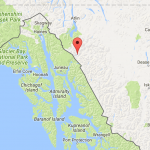 Today in the Legislature I rose to question the Minster of Energy and Mines on ongoing problems at Tulsequah Chief mine located in northwestern BC. Untreated acid mine drainage has been flowing into the Tulsequah River, a pristine salmon spawning ground, since 1957.
Today in the Legislature I rose to question the Minster of Energy and Mines on ongoing problems at Tulsequah Chief mine located in northwestern BC. Untreated acid mine drainage has been flowing into the Tulsequah River, a pristine salmon spawning ground, since 1957.
Last week Rivers Without Borders, a transboundary watershed conservation group, questioned whether or not the government was backpeddling on its promise to clean up the mine site. Today I posed that question directly to the Minister.
Below I reproduce the video and text of the exchange.
Video of Question & Answer
Text of Question & Answer
A. Weaver: The Tulsequah Chief mine, located on the best salmon-producing watershed in the B.C.-Alaska transboundary region, has been the host to a series of unfortunate events. Acid mine drainage has been entering the prime salmon spawning ground for 60 years. It’s bankrupted two companies in the last seven years. It’s an issue of profound concern for Alaska’s elected officials and is officially being opposed by the Taku River Tlingit First Nation.
It’s environmentally irresponsible, fiscally reckless and offensive to the Taku River Tlingit First Nation and Alaska for the B.C. government to allow the sordid Tulsequah Chief story to continue as is.
My question is to the Minister of Energy and Mines, who has repeatedly committed to fixing the problems that this mine has created. Will B.C. keep its word and address the Tulsequah problem with a long overdue proper cleanup, or will it allow yet another mining company to pick up where Chieftain Metals left off and let Tulsequah Chief’s controversy waste and environmental black eye to B.C. continue?
Hon. B. Bennett: I’d like to thank the member for the question. I think all of us — on this side of the House, and certainly, on the other side of the House — share the concern about any situation in the province, whether it’s mining or any other activity, that has potential to harm the environment and also has potential to harm the reputation of the province. I take the member’s question very seriously, and we take the situation very seriously on this side of the House.
The state of Alaska and the province of British Columbia have done three studies of the Tulsequah River and the Taku River to determine whether there are contaminants going into the river, and those studies so far have shown that there isn’t significant environmental harm being done. Nonetheless, the member is correct that B.C. has an obligation to manage that situation very carefully.
I can tell the member that we are committed to doing more work on that site. We did some work in the fall, up to freeze-up. We have a regular communication with the state of Alaska to make sure that they know what we’re doing up there. After breakup this spring, I know that we have crews going back into the site to do some more work.

